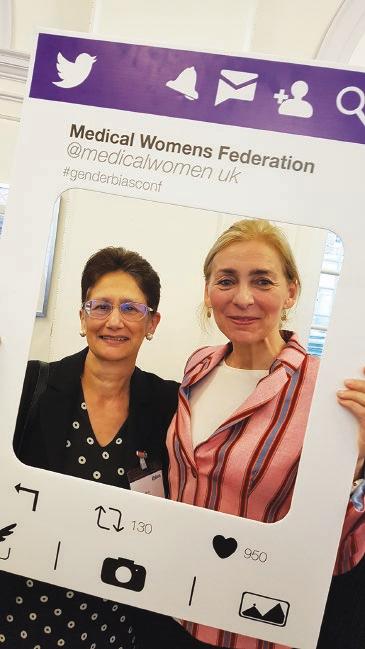
5 minute read
The global health challenge of a lifetime
Climate change: the global health challenge of a lifetime
Isobel Braithwaite graduated from Cambridge and UCL. She worked as an academic foundation doctor before starting public health training. She currently works in Public Health England’s Extreme Events team and as an Academic Clinical Fellow at University College London. She has been involved in projects on climate change and health since 2010. She has interests in healthcare sustainability, air pollution and climate adaptation for health.
Climate change is often thought of as an issue that affects polar bears or people far off in the future, but this past year has shown us that it is already here and that it is, perhaps first and foremost, a health emergency. It is bushfires in Australia and California, stopping people from being able to breathe and forcing them to jump into the sea to stay safe. It is record-breaking floods, taking lives and imposing a heavy toll on the mental health of the families and communities affected for the years to come. 1 It is unprecedented heatwaves killing thousands of older people and stretching our health systems. 2 Other impacts include increased infectious disease risks, food insecurity and indirect consequences such as exacerbation of poverty and increased risks of migration and civil unrest are also documented. 3 It is for all of these reasons that the World Health Organisation has called it ‘the greatest threat to global health in the 21st century.’ 4 What’s more, these impacts disproportionately harm the health of those already affected by health inequities - unfair and avoidable differences in health outcomes because of their gender, race, disabilities, socioeconomic status and the other axes along which power and resources are unevenly distributed. Poor and marginalised groups are at greater risk from the indirect consequences of climate change, such as food price spikes due to crop failures, and often have fewer options when it comes to adapting. Yet they have contributed the least to the problem through their own emissions. Unfortunately, the National Health Services (NHS) also contributes to this health crisis, being

responsible for around 4% of the UK’s overall climate footprint - over half of which stems from procurement (including drugs, medical and surgical equipment). This means that decisions made in everyday clinical practice have a key role to play in reducing healthcare’s climate impact. Across the health system, a transition towards sustainable clinical practice is likely to require a major shift towards prevention, streamlining care pathways to make them more efficient, minimising waste in all its forms, and increased use of effective but low-resource management options such as social and nature-based prescribing (where appropriate). This also includes switching to more environmentally sustainable drugs and anaesthetics. The flipside of the threats climate change poses to our health is that many of the actions needed for climate change mitigation are very good news for public health in the here and now. 5 For example, switching to clean energy, stepping away from cars towards bikes, walking and using public transport can clean up our air. This is important as air pollution kills around 30,000 people each year in the UK, 6 these measures also increase levels of physical activity. Better insulated homes will reduce energy losses whilst addressing the thousands of deaths due to cold homes that we see every year, whilst a reduction in consumption of red and processed meat in favour of more plant-based options could prevent thousands of cases of cardiovascular disease, stroke and cancer each year. It is for these reasons that scientists have termed it ‘our greatest global health opportunity.’

In the context of these global challenges, which can sometimes feel overwhelming, what can we as health professionals do?
• Educate ourselves further about the problems and their solutions – there are many resources, including free online courses, available to help (see below). • Connect up with others who share your knowledge and concern that the climate crisis is a health crisis. Such communities of practice are great ways to share ideas and learning, to inspire, motivate and support one another. Networks such as those of the Centre for Sustainable Healthcare, Health Care Without Harm and Health Declares Climate Emergency are excellent places to start. • Take action within our workplaces to reduce healthcare’s environmental impacts. Some steps you could take in your own workplace include connecting up with your estates team’s sustainability lead (if you work in a hospital Trust), setting up a sustainability network, and calling on your organisation to declare a climate emergency (Health Declares Climate Emergency can help you in this). Additionally, consider participating in the national ‘For a Greener NHS’ campaign (link below). • Take action in calling for the transformative public policies we need to see. Doctors are trusted, have experience of communicating complex scientific concepts clearly and can understand how climate change relates to the health problems they see in their day-to-day practice. These are enormously valuable when it comes to making change and health feel more tangible and personal for our patients and communities, and in pushing for science-based policies to protect health. Why not consider getting involved with an advocacy organisation such as the UK Health Alliance on Climate Change, Doctors for XR or Health Declares Climate Emergency?
Further reading World Health Organisation - https://www.who.int/health-topics/climate-change Lancet Countdown on Health and Climate Change - https://www.lancetcountdown.org/ Global Climate and Health Alliance - http://www.climateandhealthalliance.org/ Sustainable Development Unit - https://www.sduhealth.org.uk/ Centre for Sustainable Healthcare - https://sustainablehealthcare.org.uk/ Health Declares Climate Emergency - https://twitter.com/healthdeclares Doctors for Extinction Rebellion - https://www.doctorsforxr.com/ ‘For a Greener NHS’ campaign - https://www.england.nhs.uk/greenernhs/ Massively open online courses – • The Health Effects of Climate Change (Harvard) https://www.edx.org/course/the-health-effects-of-climate-change • Climate Change and Health: From Science to Action (Yale) https://www.coursera.org/specializations/climate-change-and-health
References
1 Jermacane D, Waite TD, Beck CR, Bone A, Amlôt R, Reacher M, Kovats S, Armstrong B, Leonardi G, Rubin GJ, Oliver I. The English National Cohort Study of Flooding and Health: the change in the prevalence of psychological morbidity at year two. BMC public health. 2018 Dec 1;18(1):330.
2 Arbuthnott KG, Hajat S. The health effects of hotter summers and heat waves in the population of the United Kingdom: a review of the evidence. Environmental health. 2017 Nov 1;16(1):119.
3 Watts N, Adger WN, Agnolucci P, Blackstock J, Byass P, Cai W, Chaytor S, Colbourn T, Collins M, Cooper A, Cox PM. Health and climate change: policy responses to protect public health. The Lancet. 2015 Nov 7;386(10006):1861-914.
4 World Health Organisation (2015) ‘WHO calls for urgent action to protect health from climate change’ https://www.who.int/globalchange/global-campaign/cop21/en/
5 Ganten D, Haines A, Souhami R. Health co-benefits of policies to tackle climate change. The Lancet. 2010 Nov 27;376(9755):1802-4.











